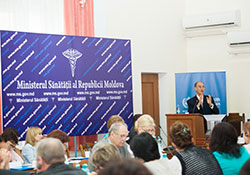Policy dialogue on performance related pay in the Republic of Moldova

WHO
A policy dialogue on performance related pay, known as P4P (payment for performance), with an emphasis on primary health care was held in Chisinau, the Republic of Moldova on 13 June 2013. This was followed by a workshop on 14 June 2013 to support further improvement in the P4P system applied in Moldova. The event was organized by WHO, the Republic of Moldova Ministry of Health and the National Health Insurance Company.
The policy dialogue aims to provide national decision-makers with an overview of the current status of the development of P4P mechanisms in primary health care, sharing the best practices of European health systems and focusing on lessons and perspectives that are relevant to the Republic of Moldova. Experts from the United Kingdom, Spain and Estonia shared the experiences of those countries in performance financing incentives and performance indicators for health and motivation in primary health care.
In his opening speech, Dr Andrei Usatii, the Minister of Health, said: “Good performance and added value for population health is the goal of the health system. It can be achieved through improvement of the quality of health services provided by the health care institutions that is a key to moving towards universal health coverage.”
Dr Jarno Habicht, WHO Representative to the Republic of Moldova commented: “One of the important pillars to fulfil and take further the European Health Policy 2020 at country level is to develop a people centred health system where primary health care has an essential role. Republic of Moldova has implemented important reforms in this field during recent years but further adjustments are needed to respond to population need. The current policy dialogue on P4P in primary health care aims to put in discussion the perspectives of how the Republic of Moldova can improve national mechanisms on P4P re-introduced in 2013 and to consult the best practices and lessons learned from other European countries’ experience.”
Current situation in pay for performance indicators
- In 2004 the Republic of Moldova launched compulsory health insurance, with a single pool of funds combining payroll contributions and budget transfers and based on “per capita” payments for primary health care services;
- Also in 2004, The Ministry of Health introduced performance based indicators as payment methods in primary health care. However the P4P mechanism was cancelled in 2009;
- In January 2013, the performance based indicators were re-introduced for financing of primary health care in addition to the age adjusted capitation. Now 85% of the funds assigned to primary health care from the insurance budget are paid per capita and the remaining 15% based on performance indicators;
- The number of indicators was increased to 22 and now includes four priority areas – TB case detection, monitoring and treatment, medical assistance to pregnant women and infants, NCD control, referral to hospitals, etc.
Programme and outcomes
Participants included about 70 representatives of the Ministry of Health, National Health Insurance Company, directors and managers of primary health care centres of different levels (for example municipalities, rural areas).
The event resulted in:
- better understanding and evaluation of performance related pay as an incentive tool for primary health care professionals from international experience and policies;
- strengthening the commitment to support the continuous implementation of P4P mechanisms addressing the challenges in retention of health personnel.
The policy dialogue conclusions and recommendations will serve as the basis for further policy actions at country level.
Joint collaboration WHO-EU
The event is one of a series of ongoing project activities focused on remuneration practices. A group of key health care stakeholders from the Republic of Moldova visited Barcelona, Spain, to study and share experiences on human resources recruitment and remuneration practices in February 2013.
The activity is part of the biennial collaborative agreement (BCA) 2012–2013, between the Ministry of Health of the Republic of Moldova and WHO/Europe. The policy dialogue and the ongoing process of strengthening the capacity of the Republic of Moldova to manage the migration of Moldovan health professionals are related to the EU-funded project “Better Managing the Mobility of Health Professionals in the Republic of Moldova”.



